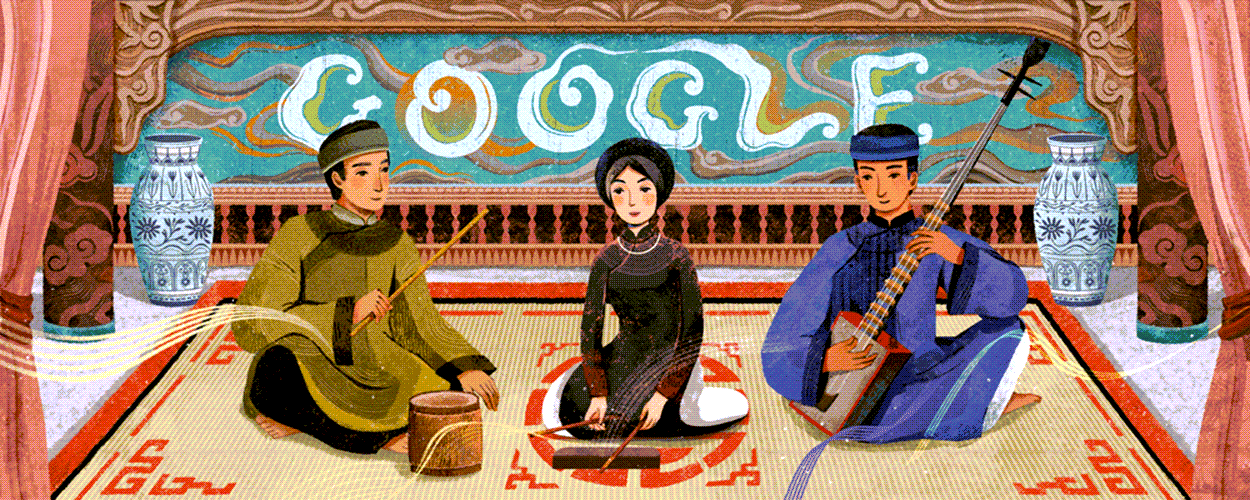Ca Trù’s Founder Commemoration Day and its Significance

Image: Google doodle
Ca tru is a fascinating type of vocal music from northern Vietnam. Ca tru has a long and distinguished history, and its roots probably date back to the 11th century. Today, the ca tru ensemble consists of a female singer who accompanies herself on a small bamboo percussion instrument (phach); an instrumentalist who plays a three-stringed lute (dan day); and a drummer who beats a small ‘praise’ drum (trong chau)
Ca Trù’s Founder Commemoration Day is the time to honor the genre widely considered to be Vietnam’s most revered traditional form of music. A style that fits somewhere in between the geisha ceremonies of Japan and the dramatic performances of opera. On 23 February 2023, google observed the Ca Trù’s Founder Commemoration Day with a Doodle.
History of Ca Trù’s Founder Commemoration Day
Ca trù’s unique sound has roots that stretch back to the 11th century. First gaining popularity as entertainment for the aristocracy of Vietnam’s royal palaces, it later made its way into the inns and communal spaces of what is now modern-day Hanoi.
The ensemble is composed of at least three performers, including one female singing intricate poetry while tapping a phach (a small bamboo box), two musicians playing traditional instruments, and occasionally dancers. Ca trù is now found in cities across Vietnam.
Performed in designated Ca trù clubs and at annual festivals, the genre has seen a recent revival due to a concentrated effort from state-run organizations and international agencies. Preservation of Ca trù is elusive due in part to it being a strictly oral tradition that is passed down only through one elite practitioner to the next generation after years of committed study.
Taking into account the precious nature of an invaluable historical relic and the difficulty of its safeguarding, UNESCO is dedicated to protecting the practice and inscribed Ca trù on the List of Intangible Cultural Heritage in 2009.
Significance of Ca Trù’s Founder Commemoration Day
It has significant cultural and historical importance for Vietnam and the preservation of Ca Trù as a traditional art form:
- Cultural Preservation: Instituting a Founder Commemoration Day could help raise awareness about the origins of Ca Trù and its historical significance. It could encourage efforts to preserve and promote this traditional art form, ensuring that future generations continue to appreciate its beauty and cultural value.
- Honoring Tradition: Recognizing Đào Tấn and her contributions to the development of Ca Trù would be a way to honor the pioneers and masters of this art form. It would acknowledge their role in shaping Vietnamese culture and music, highlighting their importance in the country’s artistic heritage.
- Educational Opportunity: A Founder Commemoration Day could provide an opportunity for educational activities such as workshops, lectures, and performances that focus on Ca Trù’s history, techniques, and significance. This would help educate the public, particularly younger generations, about the richness of Vietnam’s cultural heritage.
- Cultural Identity: Celebrating Ca Trù and its founder could strengthen Vietnamese cultural identity and pride. It would serve as a reminder of the unique artistic traditions that have been passed down through generations and contribute to a sense of national identity and unity.
- Tourism and Cultural Exchange: Establishing a Founder Commemoration Day could also have economic benefits by promoting cultural tourism and fostering cultural exchange. Visitors from around the world could learn about Ca Trù and experience its beauty firsthand, leading to greater appreciation and understanding of Vietnamese culture.
Overall, Ca Trù’s Founder Commemoration would serve as a platform to celebrate, preserve, and promote this treasured aspect of Vietnam’s cultural heritage, ensuring that it continues to thrive for generations to come.
Observer Voice is the one stop site for National, International news, Sports, Editor’s Choice, Art/culture contents, Quotes and much more. We also cover historical contents. Historical contents includes World History, Indian History, and what happened today. The website also covers Entertainment across the India and World.
Follow Us on Twitter, Instagram, Facebook, & LinkedIn

